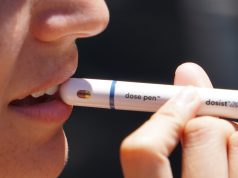In the 2018 elections, Gen Z was prominent at the polls, raising the youth turnout voter rate for the first time in decades.
But in 2022 the numbers went back down across the country, and Florida was no exception. The state’s rate declined 9.1%, from 2018 to 2022.
Florida is known to have historically low Gen Z turnout rates at the polls, and that’s what the nonprofit organization Voters of Tomorrow is trying to change. Gen Z includes eligible voters ages 18-26.
Voters of Tomorrow aims to engage young people to vote through canvassing events in schools and college campuses.
“I think we have a few problems here in Florida,” said Jayden D’Onofrio, Florida chapter president. “Neither political party has fully recognized the power of youth and the candidates running statewide had no actual outreach to youth.”
Florida candidates seem to tailor their campaigns toward an older generation, young voter Solei Campbell told Caplin News in 2022. The then 18-year-old registered voter said she was not going to vote because she did not feel the candidates connected with her.
“If it was put more on social media, such as TikTok, then we would be more aware,” said Campbell. “It would leave an impact and more Gen Z would go out to vote.”
Voters of Tomorrow helps to make sure candidates are tailoring messaging toward young voters in Florida, by coming out to college campuses to canvas, as well as lobbying for legislation that is aimed toward the Gen Z demographic.
The group recently introduced a policy proposal called “Protecting the Youth of Tomorrow” to Florida legislators. It is aimed at helping youth combat homelessness while increasing their employment opportunities and access to medical resources, said Rhea Maniar, director of policy at Voters of Tomorrow.
Their policy efforts succeeded when Florida Rep. Marie Woodson, D., House District 105, pledged to sponsor it in the upcoming legislative session.

As a senior in high school, Maniar feels passionate about not only making sure young voices are heard in government but that the government is actively working with Gen Z, not against them.
“At this point it feels like our voices are truly being heard in this process,” she said. “The power of high schoolers and college students can be really understated, but it’s so valuable, and Voters of Tomorrow makes it possible.”
The organization was started in 2019 by Santiago Mayer, a Mexican immigrant who moved to the United States in 2017 in the midst of former president Donald Trump’s administration.
“Around my high school I saw anger, confusion and a determination to be the last generation to face these issues,” said Mayer in an interview with USA Today. “Yet I also noticed that despite our strong feelings, we saw no way to fight back.
Mayer started Voters of Tomorrow and led the organization’s first initiative in 2020, Prom at the Polls, which helped register thousands of voters through digital events and social media content.
Since then, Voters of Tomorrow has contacted over 8.4 million young voters and reached out to over 100 million on social media. Its members are currently canvassing for the upcoming elections and recently helped Gen Z in Virginia get more involved through door-knocking and cold-calling thousands of potential voters.
“We’re trying really hard to make sure Gen Z is heard and has a seat at the table when it comes to politics,” said Jessica Siles, the group’s deputy press secretary. “Our generation has broken records and has really shown that we can’t just sit back and watch what’s happening in our nation anymore.”

































